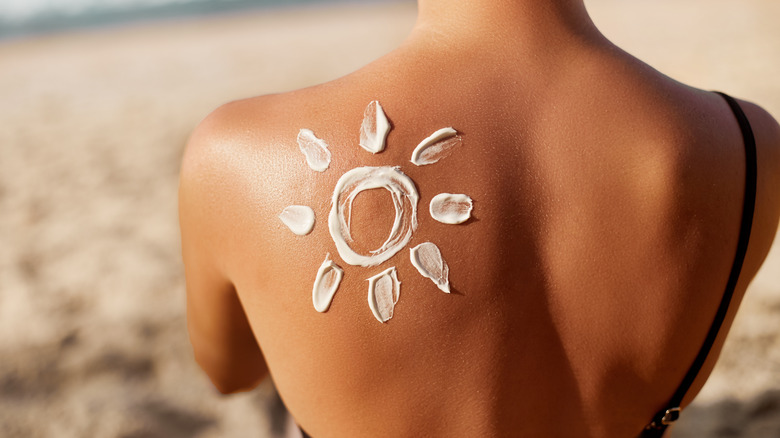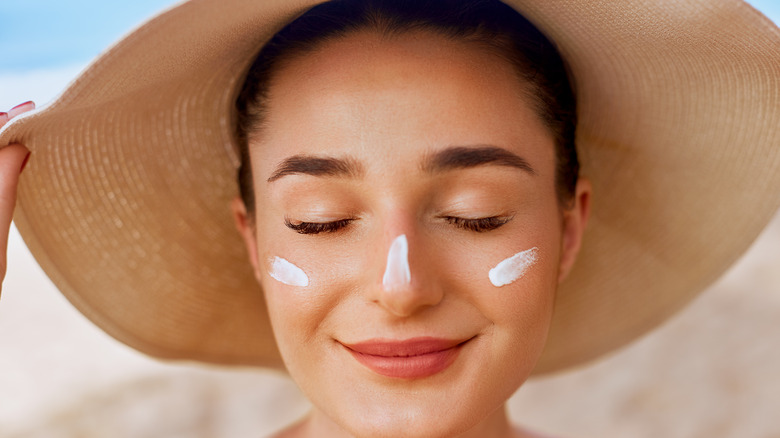Mineral Vs. Chemical Sunscreen: Which Do Dermatologists Recommend More?
One of the best ways to ensure your skin's health and youthful appearance is to protect it from the sun. Not only can sun damage cause premature aging, but it can also have other adverse effects such as accelerating your chances of getting skin cancer (via Johns Hopkins). Dermatologist Anna Lien-Lune Chien, M.D. recommends a sunscreen with an SPF of at least 30 for everyday use, and a product with SPF 60 or more if you spend a lot of time outdoors.
Like all things beauty, there's a wide variety of sunscreen and products with SPF on the market, all with their own advantages and disadvantages. It can be overwhelming, especially if it's your first time browsing the aisle for everyday sun protection. One often confusing label on sunscreen is the distinction between "mineral" and "chemical," as there's misinformation regarding both. Keep reading to find out which type dermatologists recommend more.
There are major differences between chemical and mineral sunscreen
Chances are, you've gone through life using chemical sunscreen without thinking twice about it. According to the American Academy of Dermatology (AAD), chemical sunscreens are named as such because they "contain one or more of the following ingredients: oxybenzone, avobenzone, octisalate, octocrylene, homosalate, or octinoxate" (via Byrdie). Chemical sunscreens are absorbed by the skin and convert UV rays to heat. They tend to be lighter and more sheer than mineral sunscreen, making them popular for everyday use.
Mineral sunscreen, also known as physical sunscreen, sits on top of the skin to deflect the sun's rays rather than being absorbed, per the AAD. Mineral sunscreen does this by utilizing ingredients like zinc oxide and titanium dioxide. While many hear the words "physical sunscreen" and think of unblendable, thick zinc formulas, many modern formulas have done away with that, making physical sunscreens significantly easier to use than in the past.
Mineral sunscreen is slightly more trusted
The biggest and most important difference between chemical and mineral sunscreen is that chemical sunscreen is absorbed by the skin, whereas mineral sunscreen is not (via Byrdie). Mineral sunscreen sits on top of the skin and blocks UV rays, while chemical sunscreen uses chemical ingredients to absorb the sun's rays. These ingredients have been known to irritate those with acne-prone or sensitive skin, and there have even been recent recalls of some chemical sunscreens due to adverse health effects. In July of 2021, Johnson & Johnson issued a recall of several Neutrogena and Aveeno sunscreens due to the presence of benzene, a classified carcinogen.
According to board-certified dermatologist Dr. Dendy Engelman, another benefit of mineral sunscreen is that it can "get to work protecting your skin right away, so you can slather it on and go" (via The Pioneer Woman). "Chemical sunscreen, however, requires a little more time," she says. "We recommend that patients apply it 30 minutes before going out in the sun to ensure that the sunscreen has had time to activate and fully protect your skin."
But while many dermatologists recommend mineral sunscreen, especially for those with sensitive skin, Engelman ultimately recommends both. "My main focus is to prevent sun damage that could turn into cancer or another fatal disease," she says. "Using the both together ensures full protection." Overall, while it seems that dermatologists lean towards mineral sunscreen in terms of recommendations, the important thing is that you use sunscreen, period, no matter what kind it is.


